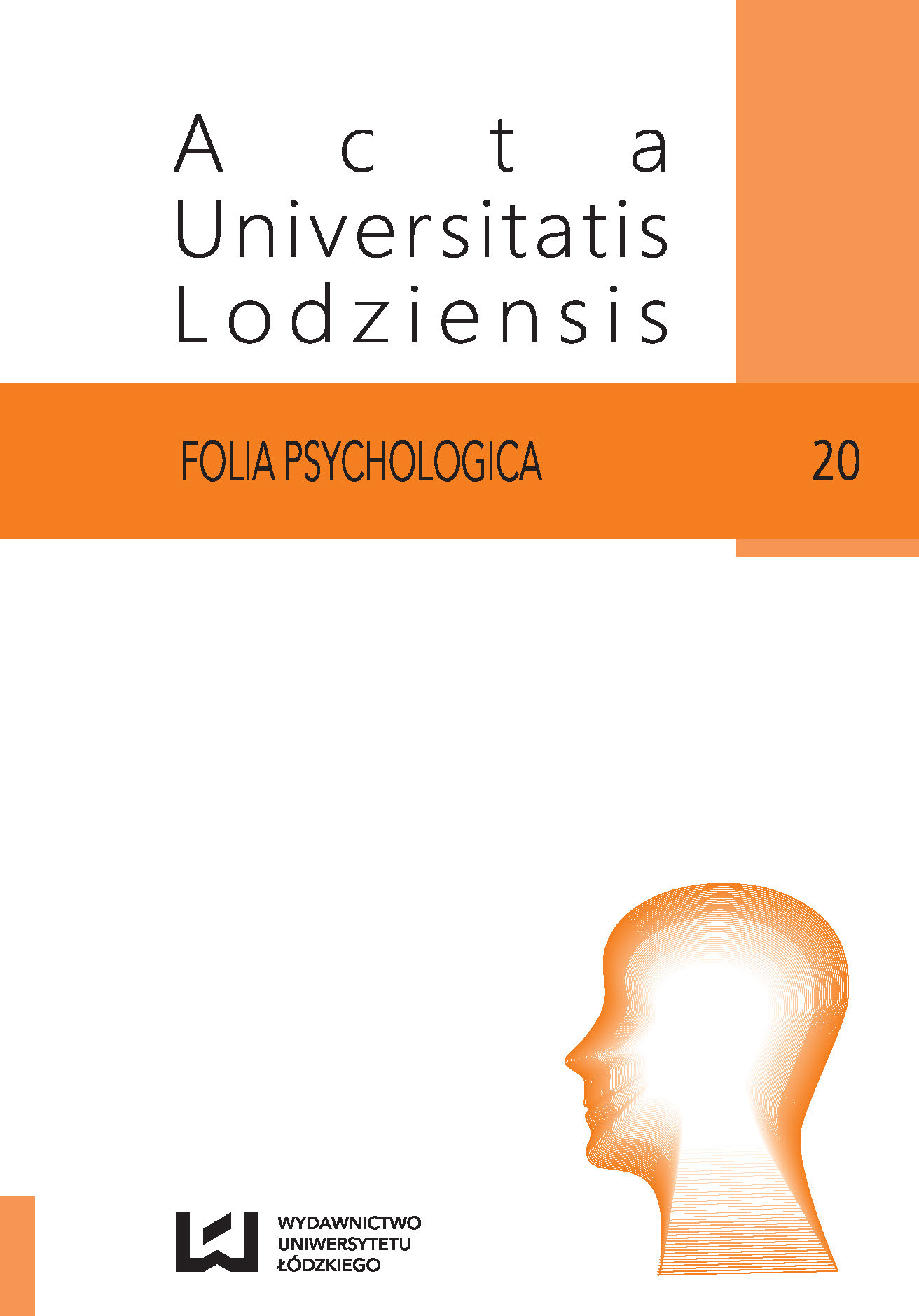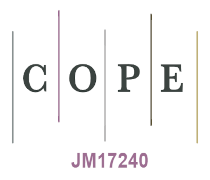Pomiar i samoocena poziomu inteligencji emocjonalnej u osób o skrajnie wysokim ilorazie inteligencji ogólnej
DOI:
https://doi.org/10.18778/1427-969X.20.08Słowa kluczowe:
inteligencja emocjonalna, inteligencja ogólna, samoocenaAbstrakt
W badaniu analizowano samoocenę w zakresie inteligencji emocjonalnej (IE) oraz poziom inteligencji emocjonalnej wśród osób (n = 43) należących do Stowarzyszenia Mensa Polska. Zastosowano trzy testy służące do oceny ogólnego poziomu inteligencji emocjonalnej lub komponentów IE: Test Inteligencji Emocjonalnej (TIE), Skalę Inteligencji Emocjonalnej – Twarze (SIE-T) oraz Test Rozumienia Emocji (TRE). Ponadto, analizowano samoocenę osób badanych w zakresie IE. Otrzymane wyniki wykazały, że: 1) osoby o wysokim IQ uzyskały wyższe wyniki w zakresie ogólnego poziomu IE (t = 5,33, p < 0,0001) oraz wyższe wyniki w zakresie poszczególnych zdolności składających się na IE w porównaniu z przeciętnymi wynikami w populacji (od t = 3,27, p < 0,005 dla zarządzania emocjami do t = 6,13, p < 0,0001 dla rozumienia emocji); 2) osoby badane nie doszacowały swoich wyników w ankietach (od t = - 5,76, p < 0,0001 do t = -8,67, p < 0,0001).
Bibliografia
Arden R., Gottfredson L., Miller G., Pierce A. (2008). Intelligence and semen quality are positively correlated. Intelligence, 37, 277–282.
Google Scholar
Austin E. J. (2005). Emotional intelligence and emotional information-processing. Personality and Individual Diff erences, 39, 403–414.
Google Scholar
Bain S. K., Bell S. M. (2004). Social self-concept, social attributions, and peer relationships in fourth, fi fth, and sixth graders who are gifted compared to high achievers. Gifted Child Quarterly, 48, 167–178.
Google Scholar
Batty G. D., Wennerstad K. M., Smith G. D., Gunnell D., Deary I. J., Tynelius P., Rasmussen F. (2009). IQ in early adulthood and mortality by middle age: cohort study of 1 million Swedish men. Epidemiology, 20, 100–107.
Google Scholar
Bee H. (2004), Psychologia rozwoju człowieka, Poznań: Wydawnictwo Zysk i Ska.
Google Scholar
Bénony H., Van Der Elst D., Chahraoui K., Bénony C., Marnier J. P. (2007). Link between depression and academic self-esteem in gifted children. Encephale, 33, 11–20.
Google Scholar
Beyer S. (1999). Gender diff erences in the accuracy of grade expectancies and evaluation. Sex Roles, 41, 279–296.
Google Scholar
Boyd D., Bee H. (2006). Lifespan Development. Boston: Allyn, Bacon.
Google Scholar
Brackett M. A., Rivers S. R., Lerner N., Salovey P., Shiff man S. (2006). Relating emotional abilities to social functioning: A comparison of self-report and performance measures of emotional intelligence. Journal of Personality and Social Psychology, 4, 780–795.
Google Scholar
Brackett M. A., Salovey P. (2008). Pomiar inteligencji emocjonalnej skalą Mayer – Salovey – Caruso Emotional Intelligence Test. [W:] M. Śmieja, J. Orzechowski (red.), Inteligencja emocjonalna. Fakty, mity, kontrowersje (s. 113–135). Warszawa: Wydawnictwo Naukowe PWN.
Google Scholar
Brackett M. A., Rivers S. E., Salovey P. (2011). Emotional intelligence: Implications for personal, social, academic, and workplace success. Social and Personality Psychology Compass, 5, 88–103.
Google Scholar
Brody N. (1997). Intelligence, schooling and society. American Psychologist, 52, 1046–1050.
Google Scholar
Ciarrochi, J. (2008). Czym jest inteligencja emocjonalna i czemu służy? Konfrontacja dwóch światopoglądów. [W:] M. Śmieja, J. Orzechowski (red.). Inteligencja emocjonalna. Fakty, mity, kontrowersje (s. 136–152). Warszawa: Wydawnictwo Naukowe PWN.
Google Scholar
Darksen J., Kramer I., Katzko M. (2009). Does a self-report measure for emotional intelligence assess something diff erent then general intelligence. Personality and Individual Diff erences, 32, 37‒48.
Google Scholar
Deary I. J., Whiteman M. C., Starr J. M, Whalley L. J., Fox H. C. (2004). The impact of childhood intelligence on later life: following up the Scottish mental surveys of 1932 and 1947. Journal of Personality and Social Psychology, 86, 130–147.
Google Scholar
Gardner H. (2006). On failing to grasp the core of MI theory: A response to Visser et al. Intelligence, 34, 503–505.
Google Scholar
Goldenberg I., Matheson K., Mantler J. (2006). The assessment of emotional intelligence: A comparison of performance-based and self-report methodologies. Journal of Personality Assessment, 86, 33–45.
Google Scholar
Goleman D. (1997). Inteligencja emocjonalna. Poznań: Media Rodzina.
Google Scholar
Gottfredson L. S. (2004). Life, death and intelligence. Journal of Cognitive Education and Psychology, 4, 23–46.
Google Scholar
Hoge R. D., Renzulli J. S. (1993). Exploring the link between giftedness and self-concept. Review of Educational Research, 63, 449–465.
Google Scholar
Janos P. M., Fung H. C., Robinson N. (1985). Self-concept, self-esteem, and peer relations among gifted children who feel “diff erent”. Gifted Child Quarterly, 29, 78–81.
Google Scholar
Johnson W., Carothers A., Deary I. J. (2008). Sex diff erences in variability in intelligence: A new look at the old question. Perspectives on Psychological Science, 3, 518–531.
Google Scholar
Kaufman A. S., Kaufman J. C. (2001). Emotional Intelligence As an Aspect of General Intelligence: What Would David Wechsler Say? Emotion, 1, 258–264.
Google Scholar
Kerr B., Colangelo N., Gaeth J. (1988). Gifted Adolescents’ Attitudes Toward Their Giftedness. Gifted Child Quarterly, 32, 245–247.
Google Scholar
Klein A. G., Zehms D. (1996). Self-concept and gifted girls: A cross sectional study of intellectually gifted females in grades 3, 5, 8. Roeper Review, 19, 30–33.
Google Scholar
Kuh D., Richards M., Hardy R., Butterworth S., Wadsworth M. (2004). Childhood cognitive ability and deaths up until middle age: a post-war birth cohort study. International Journal of Epidemiology, 33, 408–413.
Google Scholar
Lawlor D. A., Najman J. M., Batty D., O’Callaghan M. J., Williams G. M., Bor W. (2006). Early life predictors of childhood intelligence: fi ndings from the Mater-University study of pregnancy and its outcomes. Pediatric and Perinatal Epidemiology, 20, 148–162.
Google Scholar
Leary M. R., Baumeister R. F. (2000). The nature and function of self-esteem: Sociometer theory. [W:] M. P. Zanna (red.), Advances in experimental social psychology (s. 1–62). New York: Academic Press.
Google Scholar
Lynn R. (2010). In Italy, north-south diff erences in IQ predict diff erences in income, education, infant mortality, stature, and literacy. Intelligence, 38, 93–100.
Google Scholar
Machin S., Pekkarinen T. (2008). Global sex diff erences in test score variability. Science, 33, 1331–1332.
Google Scholar
Matczak M., Piekarska J., Studniarek E. (2005). Skala Inteligencji Emocjonalnej – Twarze (SIE-T). Podręcznik. Warszawa: Pracownia Testów Psychologicznych PTP.
Google Scholar
Matczak M., Piekarska J. (2011). Test Rozumienia Emocji (TRE). Podręcznik. Warszawa: Pracownia Testów Psychologicznych PTP.
Google Scholar
Marsh, H. W., Hau, K. (2003). Big-fi sh–little-pond-eff ect on academic self-concept: A cross-cultural (26 country) test of the negative eff ects of academically selective schools. American Psychologist, 58, 364 –376.
Google Scholar
Mayer J. D., Salovey P. (1997). What is emotional intelligence? [W:] P. Salovey, D. Sluyter (red.), Emotional development and EI: Educational implications (s. 3–34). New York: Basic Books.
Google Scholar
Mayer J. D., Salovey P., Caruso D. R., Sitarenios G. (2001). Emotional Intelligence as a Standard Intelligence. Emotion, 3, 232–242.
Google Scholar
Mayer J. D., Salovey P., Caruso D. R. (2002). Mayer-Salovey-Caruso Emotional Intelligence Test (MSCEIT) user’s manual. Toronto: Multi-Health Systems.
Google Scholar
Nail J. M., Evans J. G. (1997). The emotional adjustment of gifted adolescents: A view of global functioning. Roeper Review, 20, 18–21.
Google Scholar
Nisser U., Boodoo G., Bouchard T. J., Boykin A. W., Brody N., Ceci S. J. i in. (1996). Intelligence: knowns and unknowns. American Psychologist, 51, 77–101.
Google Scholar
O’Connor K. J. (2005). Stereotypes and Beliefs Regarding Intellectually Gifted Students. Niepublikowana rozprawa doktorska. Connecticut: University of Connecticut.
Google Scholar
Petrides K. V., Furnham A. (2000). Gender diff erences in measured and self-estimated trait emotional intelligence. Sex Roles, 42, 449–461.
Google Scholar
Petrides K. V., Furnham A., Martin G. N. (2004). Estimates of Emotional and Psychometric Intelligence: Evidence for Gender-Based Stereotypes. The Journal of Social Psychology, 144, 149–162.
Google Scholar
Robinson A., Clinkenbeard P. R. (2008). History of Giftedness: Perspectives from the Past Presage Modern Scholarship. [W:] S. I. Pfeiff er (red.), Handbook of Giftedness in Children (s. 13–34). New York: Springer Science and Business Media.
Google Scholar
Rudasill K. M., Capper M. R., Foust R. C., Callahan C. M., Albaugh S. B. (2009). Grade and Gender Diff erences in Gifted Students’ Self-Concepts. Journal for the Education of the Gifted, 32, 340–367.
Google Scholar
Schutte N. S., Malouff J. M., Hall E. L., Haggerty D. J., Cooper J. T., Golden C. J. i in. (1998). Development and validation of a measure of emotional intelligence. Personality and Individual Diff erences, 25, 167–177.
Google Scholar
Śmieja M., Orzechowski J., Asanowicz D. (2012). Test Inteligencji Emocjonalnej (TIE). Podręcznik. Kraków: Wszechnica Uniwersytetu Krakowskiego.
Google Scholar
Spearman C. E. (1927). The abilities of man. London: Macmillan.
Google Scholar
Storek J., Furnham A. (2012). Gender and gender role diff erences in Domain-Masculine Intelligence and Beliefs about Intelligence: A study with Mensa UK members. Personality and Individual Diff erences, 53, 890–895.
Google Scholar
Terman L. M. (1925). Mental and physical traits of a thousand gifted children. Stanford, CA: Stanford University Press.
Google Scholar
Van Rooy D. L., Alonso A., Viswesvaran C. (2005). Group diff erences in emotional intelligence test scores: Theoretical and practical implications. Personality and Individual Diff erences, 38, 689–700.
Google Scholar
Zeidner M., Shani-Zinovich I., Matthews G., Roberts R. (2005). Assessing emotional intelligence in gifted and non-gifted high school students: Outcomes depend on the measure. Intelligence, 33, 369–391.
Google Scholar









